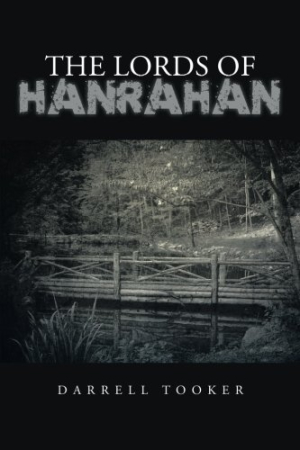The Lords of Hanrahan
An ordinary young woman becomes a hero when entering a supernatural world in this enjoyable adventure.
The characters in the supernatural novel Lords of Hanrahan by Darrell Tooker are likable because they are ordinary people thrust into extraordinary circumstances. The plot effectively toggles between Connecticut and Hanrahan, a village in a parallel universe that only pregnant women can access through a closet in the old McPherson house. Laura, who grew up in the area, had visited the home as a child and is summoned back as an adult when she and her new husband, Bobby, a childhood sweetheart, are expecting their first child. While searching the house, she is pulled into Hanrahan.
The supernatural world of Hanrahan is well crafted, with established rules about how and why people arrive that remain consistent throughout the narrative. But characters’ actions in Hanrahan and outside of it are implausible at times. For example, Laura’s decision to go, pregnant and alone, to the McPherson house, even though it petrified her as a child, is not fully explained, other than that she felt she was needed there. Additional information would make her actions more believable.
Once in Hanrahan, Laura’s experience unfolds slowly across many chapters. There, drama rests solely in her desire to return home. While she talks about wanting to be with her husband, the dialogue rarely reflects her feelings. Her demeanor does not suggest a sense of urgency. At times, the dialogue is too casual and folksy for the significance of the events; despite being separated from her family for months, on her return she says she looks forward to hearing all the gossip she missed. There’s a disconnect between the gravity of characters’ experiences and their verbal responses. Overall, the comments don’t ring true given the dramatic events the characters endure.
Awkward dialogue between characters has a distancing effect. For example, the story begins in the late 1980s, when Laura, Bobby, and their friends are teenagers, and they go to the believed-to-be-haunted McPherson house. Laura’s friend Louise says, “The Connecticut weather hasn’t been good for it,” referring to a sofa that has been left outside of the McPherson house. Laura responds at another point that a character “scared the bee-Jesus out of me,” and Louise often refers to Laura as “honey.” The language is not typical for teenagers in the contemporary Northeast.
Other descriptions about ordinary events also serve to bog down the plot with unnecessary detail. A description of Laura states: “She began to cry. She didn’t know what good it would do, but it seemed to be the thing to do at the time.” Soon after, she thinks, “Maybe I should rest a spell.” A more concise writing style, with more conversational, contemporary dialogue, would quicken the pace.
The characters are likable, but not always relatable or believable. Still, the novel will appeal to readers who enjoy entering new worlds.
Reviewed by
Maria Siano
Disclosure: This article is not an endorsement, but a review. The publisher of this book provided free copies of the book and paid a small fee to have their book reviewed by a professional reviewer. Foreword Reviews and Clarion Reviews make no guarantee that the publisher will receive a positive review. Foreword Magazine, Inc. is disclosing this in accordance with the Federal Trade Commission’s 16 CFR, Part 255.

